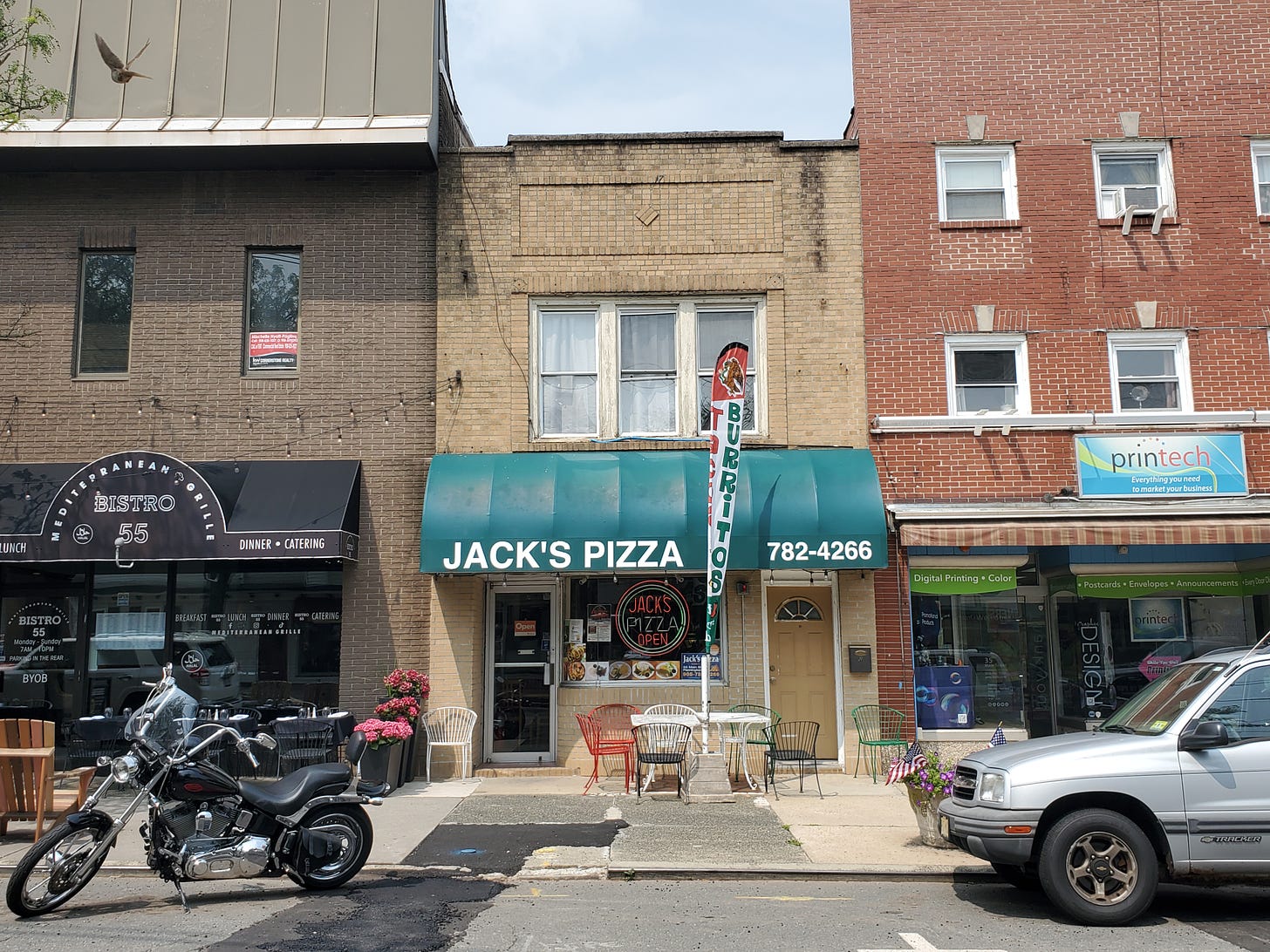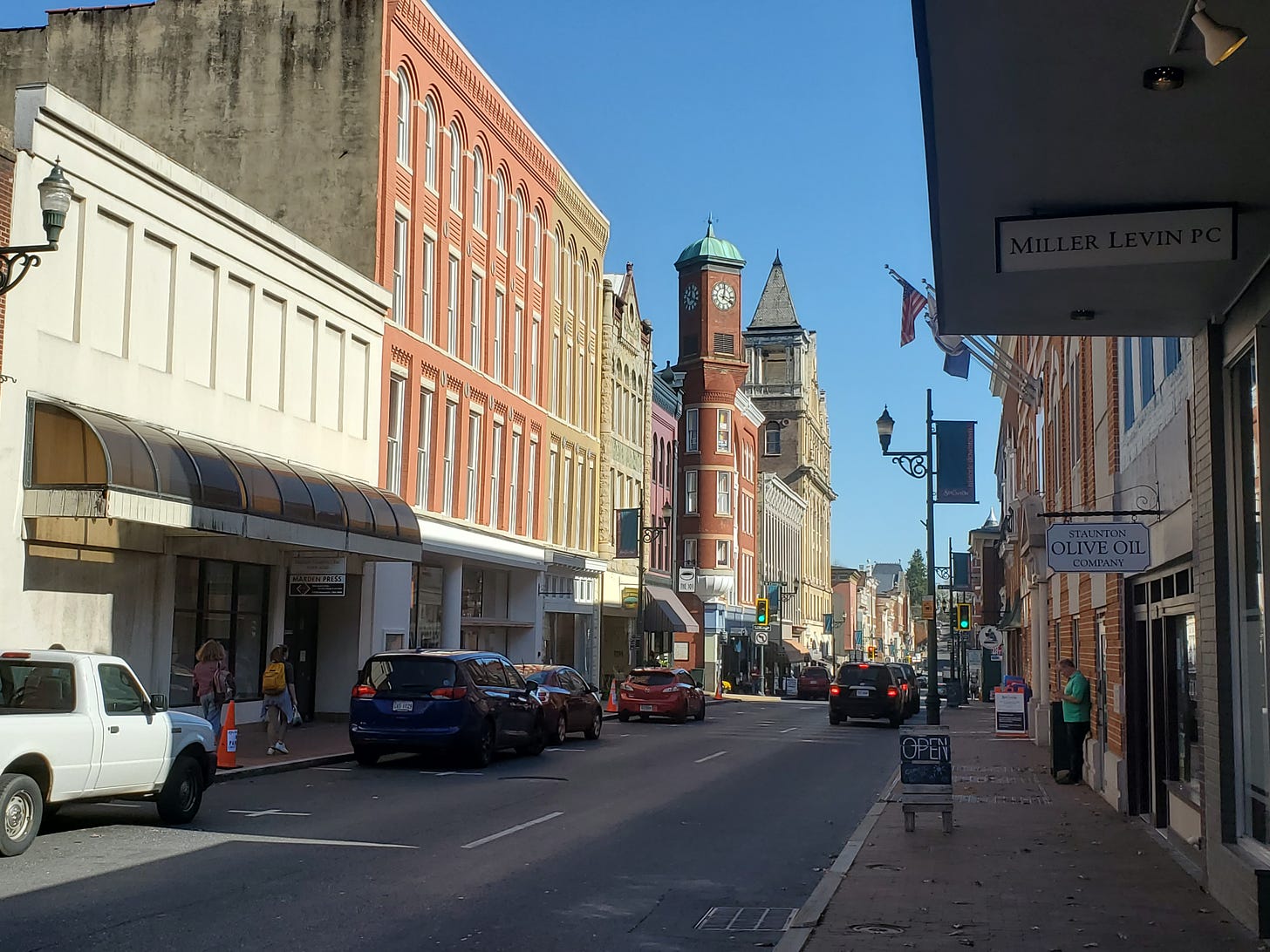I didn’t know, and didn’t want to know, who Jason Aldean is. But it was impossible not to hear the buzz about his recent song “Try That In A Small Town.” I’m the small towns guy, and I had to write something, because I didn’t want Aldean to give small towns a bad name.
So he sings this:
Sucker punch somebody on a sidewalk
Carjack an old lady at a red light
Pull a gun on the owner of a liquor store
Ya think it’s cool, well, act a fool if ya likeCuss out a cop, spit in his face
Stomp on the flag and light it up
Yeah, ya think you’re toughWell, try that in a small town
See how far ya make it down the road
Around here, we take care of our own
You cross that line, it won't take long
For you to find out, I recommend you don’t
Try that in a small town
Then there’s the bit about how he has a gun, which they might be able to confiscate in the city, and then this:
Full of good ol’ boys, raised up right
If you’re looking for a fight
Try that in a small town
None of the activities mentioned are nice, of course. But one of them—burning the flag—is actually not a crime. I don’t like flag-burning, but the Supreme Court determined in 1989 that it was covered by the First Amendment. Has the draft of this song been kicking around since before Texas v. Johnson? Or does Aldean believe it’s appropriate to punish free expression with a punch? Somebody should ask him what he thinks about punching Nazis?
The song was released in May, but the music video was released in July, which sparked most of the controversy. In particular, the video depicts what Aldean claimed were real news clips of urban violence. That was the heart of the controversy—the (barely) subtext of vigilante violence as an appropriate response to urban unrest. But apparently, some of the clips were stock footage, or even footage of protests in other countries. If the cowboy boot fits, wear it.
Asked about the negative reactions, Aldean said, in more words, I didn’t say what I said. The song just does not resemble Aldean’s characterization of it:
Try That In A Small Town, for me, refers to the feeling of a community that I had growing up, where we took care of our neighbors, regardless of differences of background or belief. Because they were our neighbors, and that was above any differences. My political views have never been something I’ve hidden from, and I know that a lot of us in this country don’t agree on how we get back to a sense of normalcy where we go at least one day without a headline that keeps us up at night. But the desire for it to – that’s what this song is about.
This is a lovely sentiment. It’s too bad it isn’t what the song is about.
But the real point is deeper. This is what the lyrics of the song suggest: small towns are not real places with real people, but blank canvases—mere backdrops against which to perform grievance and reactionary politics. They are receptacles for resentments. Their political-cultural significance outweighs any actual characteristic they have. “The town” is different from “the city” because neither the town nor the city is an actual thing on the ground with a history.
To my Northeastern (or, as it is, Yankee) eyes, there is no real difference between what we call a town and a city, except size. A single urban neighborhood is almost indistinguishable from a small town. The built pattern of a classic small town is deeply urban. Forget the anti-urban tautology that says “Cities are bad, so nice places can’t be cities.” Tell me these are not tiny cities.
Two of them, by the way, are in Virginia.
In a previous piece, I wrote:
I find it curious to see people—inhabiting a town whose old commercial blocks are visually almost indistinguishable from those of Brooklyn or Philadelphia—insisting that “the city” is not an actual thing with characteristics, but a vague idea. Our town is not a “city,” because we do not like “the city,” but we like our town.
But it makes very little sense to define a city based on a nebulous cultural outlook; it makes much more sense to focus on the land use and development pattern. If you strip away the culture-war overlay—“coastal elites” and “flyover country,” debates and conspiracy theories over “15-minute cities,” identifications of “cities” and “suburbs” with political ideologies generally—you will find no evidence that there is actually any such thing as a “small town,” as we currently conceive of it.
Small-towners are really rural urbanites. Nonetheless, of course, there are places that we can recognize as “towns.” Did Aldean grow up in one? Oops, he grew up in Macon, Georgia, a city of over 100,000 people. Does he live in one now? Oops, he lives in Nashville (no surprise), having recently moved there from his “massive Tennessee mansion.”
The kind of intellectually dishonest nonsense that is “Try That In A Small Town” is hardly unique to Aldean, though he’s done it before:
On Jason Aldean’s 2010 album, My Kinda Party, the country star perfected his image as a champion for small-town America. The record’s final single, “Fly Over States,” placed him on a plane, listening as two big-city businessmen trashed the fields below them. If they could only meet farmers in Indiana or see the moon from Kansas, Aldean reckoned, “they’d understand why God made those flyover states.” Another track, “Country Boy’s World,” finds a similar scenario in a relationship, with a boy showing a doubtful city girl his favorite parts of the country, like smelling wildflowers on a dirt road and drinking sweet tea with homemade ice cream. “She fell in love,” he sings by the end.
None of this bears any resemblance to reality. Plenty of big-city people love the country and small towns. Many, of course, have left the city for such places. Many businesses out in the countryside surrounding major metro areas rely on urban money and customers. When we have proper cities and a proper country, we have beautiful regions that work together. The odd thing out here is suburban sprawl.
For me this all comes back to land use. It comes back to what these places actually are, and how and why they were built. But Aldean isn’t thinking about land use when he sings about small towns. He’s thinking about politics. Berkeley or Burlington are some other kind of place. The small town is any place that Aldean politically approves of. It’s not a place; it’s an idea.
This is not art, it is not music, it is hardly entertainment. It’s essentially a political ideology concealed as music; quasi-conspiracy-theories about crime and urbanization and the left with a twang and a fiddle.
Well, this is how ordinary middle-Americans feel. You’re not saying American cities are doing great, are you? You just don’t get it!
That’s what some of the responses to the critiques of Aldean’s song sound like. There’s a lot of talking past each other. I saw a tweet from a conservative writer in Appalachia, whose work I actually find quite lovely, and she said something to the effect of “This song is almost number one, the chattering class doesn’t get it.” The thing is, I’m fairly sure she’d also agree with my appreciation of small towns as tiny, low-intensity urban communities and, ideally, somewhat self-sufficient economies. I don’t entirely understand where the disagreement is, to be honest.
What I’ll say is that urban crime is a problem, and some urbanists are too cavalier about it. I understand that there are real cultural and lifestyle differences between (often) conservative small towns and (often) liberal big cities. And it’s true that American cities are rather poor by global developed-world standards. I can even understand this lingering feeling that “the left” hectored people for not wearing masks while making excuses for urban riots, or some version of this. That’s a narrative, not a fact, but it’s one of those narratives that explains some things because it’s widely held. And all of that is on top of the longstanding tropes about city people and flyover country and all that.
I get that. What I don’t get is identifying your place and your people not with their virtues, but with what they’re willing to do to people they don’t like. I don’t get abstracting their physicality, their heritage, their placeness.
Look—you can sit in a mansion and croon about how small towns are distinguished by their resentful cultural politics, and how cities are defined by their problems. And you can, apparently, make money doing it. But you can’t tell me it’s true.
I did grow up in—a few minutes outside, technically—a small town. Before my time, we had supermarkets and all kinds of everyday businesses right on Main Street. I found an old newspaper clipping from the 1920s or 1930s about how everybody in the area came to town for everything they needed. We had a hotel and a train station.
By the time I was a kid, places like this were little more than bedroom communities. But their history—built, and human—is that of a small working city. Politically, it’s a mixed place. Some people supercommute to the city, many work locally. I don’t think people think very much about whether they are town or country or city people.
So in a place like that—a real, existing, small town—I’m not sure your phony small-town spiel is gonna fly.
Related Reading:
Suburbia Was a Housing Program
Thank you for reading! Please consider upgrading to a paid subscription to help support this newsletter. You’ll get a weekly subscribers-only post, plus full access to the archive: over 700 posts and growing. And you’ll help ensure more material like this!







Aldean's attitude exemplifies how the opioid crisis flourished for decades. You won't find the New Jerusalem anywhere on Earth. I've seen far more discarded heroin needles in the small town I grew up in than the big city I live in now.
I grew up in a small town, population under 2,000, and I think Aldean's song is stupid and divisive.